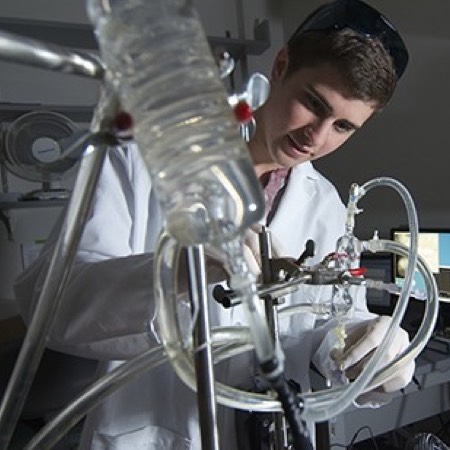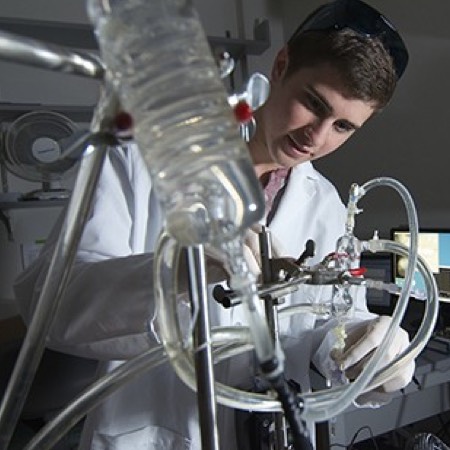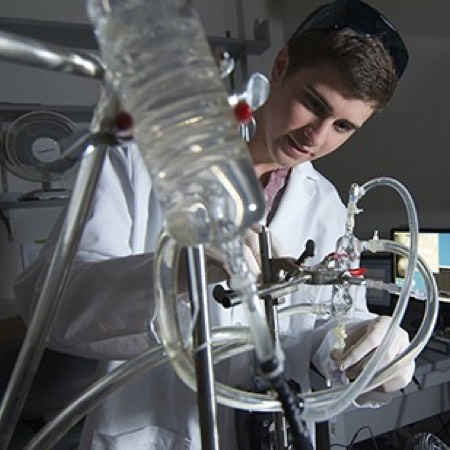About the Department
As the Department of Economics, our mission is to educate economists who are technically equipped, practically competent, and capable of leadership in shaping the rapidly evolving global economy. With our Cooperative Education Program—unique in Turkey—our strong interdisciplinary curriculum, and our collaborations with the industry, we prepare our students not only to adapt to economic transformations but also to lead them. Inspired by our motto, “The Economists of the Future are at TOBB ETÜ Economics,” we aim for our innovative, entrepreneurial, and globally-minded graduates to contribute value to both our country and the world.
WHAT IS ECONOMICS?
Economics is the scientific study of how individuals and societies use their limited resources to satisfy their extensive wants and needs. In other words, economics is the social science that examines how people, firms, and governments make decisions and the consequences of these decisions.
The main topics that economics addresses include questions such as “How can resources be used efficiently?,” “Which production methods are more effective?,” "How are prices determined?,” “How do markets function?,” “How can unemployment be reduced?,” and “How can income equality be achieved?”. In seeking answers to these questions, economics utilizes both microeconomic and macroeconomic perspectives. While microeconomics examines individual economic behaviors, macroeconomics focuses on large-scale issues such as national income, inflation, unemployment, interest rates, exchange rates, as well as monetary and fiscal policies of the government.
Economics is a discipline that extensively uses quantitative methods. It employs mathematical models, data analysis, and artificial intelligence to predict human and societal behaviors. In addition, economics uses controlled experiments to test various theories while also employing qualitative tools such as surveys, interviews, and case studies for in depth analyses of economic agents and their preferences.
In conclusion, economics is a discipline of critical importance for increasing societal welfare, using resources efficiently, and ensuring economic stability. It helps individuals and businesses make informed decisions and also plays a significant role in governments’ making of tax policies, budget planning, and social programs. Additionally, it contributes to the understanding of global economic relations as well as the development of international trade and cooperation.
WHERE DO ECONOMISTS WORK?
Economists in Turkiye and around the world play significant roles in the public sector by working in various public agencies, central banks, and international organizations. In Turkiye, they conduct economic analyses, interpret data, and develop policies in institutions such as the Ministry of Treasury and Finance, the Central Bank, and the Turkish Statistical Institute. Globally, economists work in organizations like the World Bank, the IMF, and the OECD, where they analyze global economic trends and work on international economic policies.
In the private sector, economists are employed by various banks, financial institutions, insurance companies, and large firms. Here, they conduct market analyses, perform risk assessments, develop investment strategies, and make economic forecasts. Consulting firms are also common workplaces for economists. Global consulting firms such as PricewaterhouseCoopers (PwC) and Deloitte employ economists who provide strategic planning to companies. These economists specialize in economic modeling, financial analysis as well as business development.
In academia, economists work in universities and research institutes, engaging in scientific research and teaching activities.
In conclusion, economists work in a wide range of institutions and companies, undertaking tasks such as economic analysis, policy development, market evaluations, risk analysis, and academic research. Through these roles, they contribute to shaping economic decisions and policies at both national and international levels.
WHY TOBB ETU ECONOMICS?
Strong academic staff, the majority of whom hold PhDs from prestigious universities abroad, including individuals with high international experience and recognition, who have served as senior public officials and whose signatures are found on the Turkish Lira.
High-quality and modern undergraduate program with only 13 students per faculty member.
Innovative master’s and doctorate programs modeled after the current curricula of the world’s leading universities.
Globally focused education where most courses are taught in English and a second foreign language is mandatory.
High scholarship rate (in 2023, 7 full-scholarship students, 25 students with 50% scholarships, and 17 fee-paying students).
The Coperative Education program, which provides nearly a year of work experience with different institutions and companies through a trimester education system, uniquely offered only by TOBB ETU in Turkiye.
Rich curriculum with flexible minor and double major options that allow students to specialize in different areas of interest.
SOME FIRMS AND INSTITUTIONS OUR STUDENTS INTERN IN CO-OP
Ziraat Bank · PriceWaterhouseCoopers (PwC) · Court of Accounts of the Republic of Turkiye · ROKETSAN · Arçelik Inc. · Gama Holding · HiltonSA · Customs and Tourism Enterprises Inc. · Rönesans Holding · Credit Guarantee Fund Inc. · Türk Traktör · Economic Development Foundation · Yüksel Construction Inc. · STM Defense · ICE EEIG · TEPAV · Union of Chambers and Commodity Exchanges of Turkiye · Credit Guarantee Fund Inc. · Demir Export Inc. · Mitaş Investment Inc. · Ministry of Trade · Ankara Chamber of Commerce · Garanti BBVA Bank · Kuveyt Türk Participation Bank
SOME FIRMS AND INSTITUTIONS OUR ALUMNI ARE EMPLOYED
Union of Chambers and Commodity Exchanges of Turkiye and its affiliates · Garanti BBVA Bank · Kuveyt Türk Participation Bank · İş Bankası · Vakıfbank · Price Waterhouse Coopers (PwC) · Deloitte · Turkish Airlines · Türk Telekom · Arçelik · TÜBİTAK · KPMG Turkiye · Capital Markets Board of Turkiye · ASELSAN · EnerjiSA
* We also have alumni who have completed their PhDs at such universities as Princeton University, University of Chicago, and University of Virginia. Some alumni have become successful academics at such prestigious universities as University of Essex, Sabancı University, Boğaziçi University, Koç University, Ankara Social Sciences University, and TOBB ETU.


.jpg)
.jpg)
.jpg)


